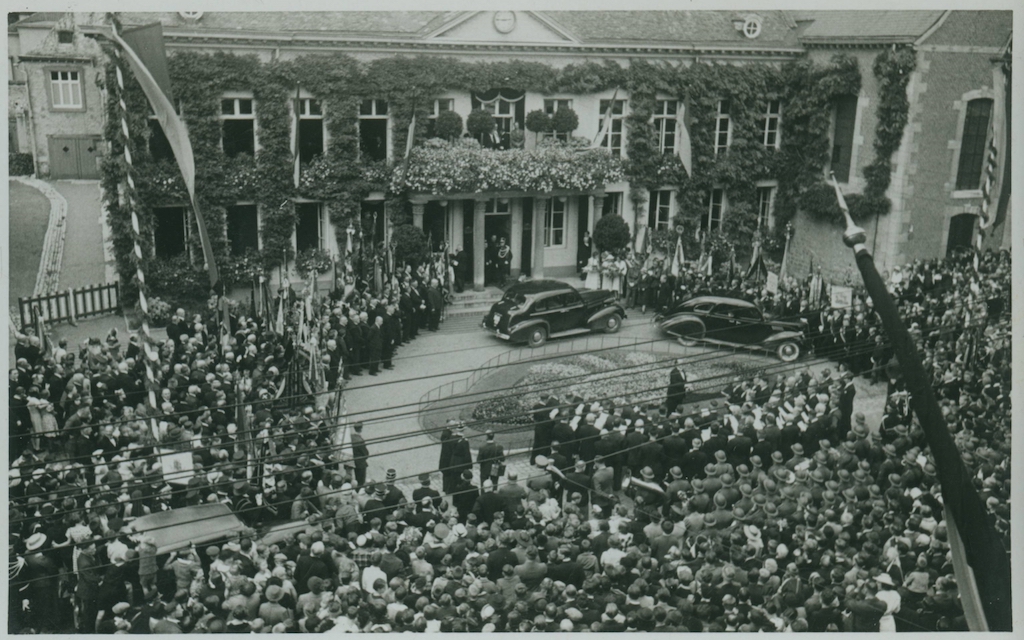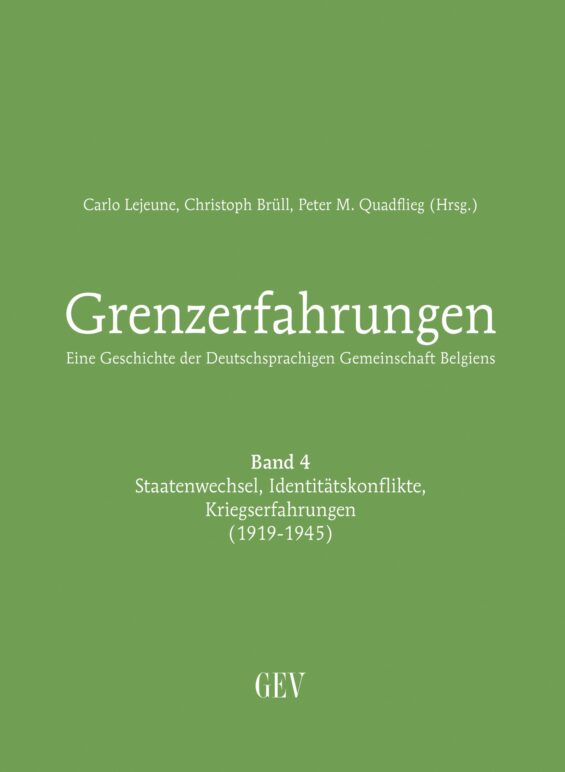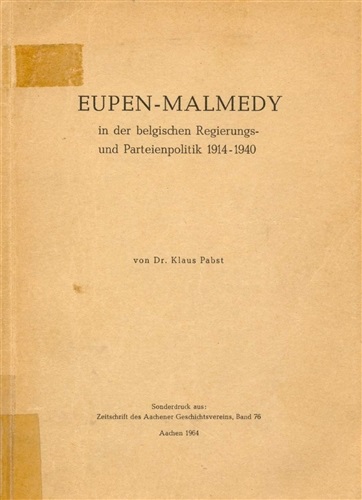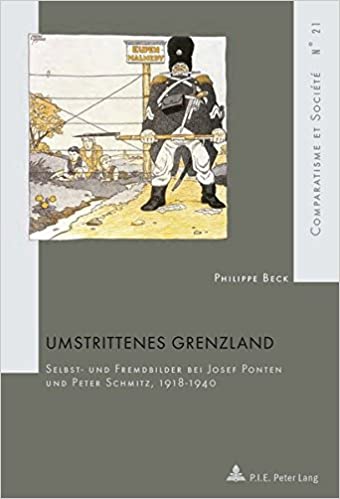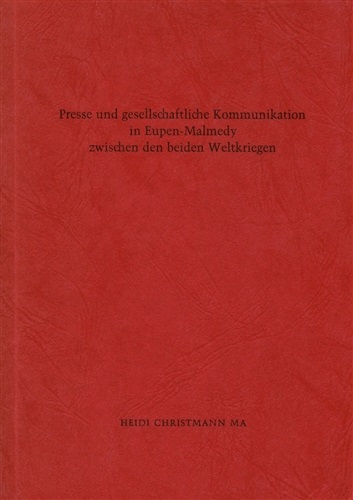-
Integration is a two-way social process between majority and minority. Did the conditions for the integration of German-speaking Belgians to succeed exist in 1920? There was, for sure, a great deal of reservation on the part of Belgian society: Belgian nationalist propaganda had repeatedly spoken of the ‘cantons rédimés’, the recovered cantons. However, Flemings and Walloons soon discovered that a large part of these ‘rediscovered brothers and sisters’ spoke German just like the former enemy. They had little knowledge of French. The proximity between German and Limburg dialects was a help in everyday life at best. Yet a vast majority of the population in today’s East Belgium still felt that they were German citizens and part of German culture. The Socialist Belgian Workers’ Party (POB/BWP) had therefore warned against this affiliation, while among conservative-bourgeois circles in Brussels, disillusionment was spreading.
The citizens from Eupen-Malmedy-Sankt Vith were now a linguistic and cultural minority in Belgium. Their political expectations of the Belgian state differed from those of their Germanophone Belgian neighbours, notably in the areas around Montzen and Arlon. The majority of the new Belgians did not understand the language(s) of the new fatherland. Yet, the Belgian state was quick to invest in infrastructure and public buildings (schools, churches), thus also creating job opportunities, amongst other things.
After 1925, there were no clear signals from Brussels in favour of Eupen-Malmedy-Sankt Vither. Different visions competed in Belgian domestic policy: one group of opinion set its sights on extensive assimilation of the region. This was to be achieved through a gradual introduction of the French language in schools and in the administration. This basic attitude stemmed from the colonial thinking of the turn of the century, which linked sovereignty with the imposition of one’s own values, culture, and language. Another group focused on respect and cultural tolerance. This inclusive vision was based on the liberal principles of the Belgian state.
Previous research has shown that lasting integration of the German-speaking Belgians during the interwar period was not successful.
Some events were unfortunate. In 1926, the new Belgians elected the Verviers lawyer Jenniges as ‘their’ candidate by an overwhelming majority. At first, he was considered elected, yet then it turned out that the votes were not enough to enter parliament. This once again shook confidence in Belgian democracy.
Between 1926 and 1929, Belgium and Germany conducted secret restitution negotiations. During the war, the occupying power had introduced a significant amount of Reichsmark into Belgium. The money had now lost its value. In order to finally resolve this issue, negotiations were under way to exchange the Eastern Cantons for this significant amount of money. The two countries more or less reached an agreement. However, when these negotiations were leaked to the public by a journalist, France vetoed the deal as it did not want a single detail of the Versailles Treaty to be changed. This was a second unfortunate event that shook the confidence of German-speaking Belgians in their new fatherland.
At the same time, the young Weimar Republic deliberately obstructed integration of Eupen-Malmedy-Sankt Vith into the Belgian state. In Germany, the Treaty of Versailles was widely rejected as the ‘Dictate of Versailles’. In 1925, German government agencies resumed a secret German policy in Eupen-Malmedy-Sankt Vith, already conducted between 1920 to 1923. On the one hand, it promoted German language and culture; on the other, it was meant to strengthen the desire to return to Germany. Associations, organisations, and societies from the fields of culture, business, and politics received financial and non-material support, a policy known as irredentism.
Until 1933, the conflict was a nationalist one: the citizens in ‘New Belgium’, as the area was called during the interwar period, had a choice between democratic Belgian and democratic German fatherlands. These tensions took on a new quality after 1933, when the National Socialists came to power in Germany. Now it was no longer two democratic states competing for the favour of the new Belgians, but a democracy and an inhuman dictatorship. Historical work shows, however, that many citizens of the eastern cantons did not make this distinction at the time.
Most inhabitants of the eastern cantons adopted a wait-and-see, adaptive attitude at the time. They allowed themselves to be guided by their own short-term interests: in 1929, more than 75 percent of eligible voters voted for democratic parties that advocated a return to Germany or a secret referendum. In 1939, the Heimattreue Front (Front loyal to the fatherland), which had German-nationalist leanings and was close to the Nazi regime, received 45 percent of the vote. Openly National Socialist camouflage organisations had around one hundred members. They included the Glider Club in Eupen (with the same structure as the SA in Germany), the Saalschutz (‘assembly hall protections quad’) in Malmedy or the Archers’ society in Sankt Vith.
These pro-German parties and organisations attempted to frustrate integration in Belgium. The pro-Belgian parties, on the other hand, strove for it. The latter were also prepared to become politically involved via national parent parties and to participate in domestic Belgian political life.
For the Belgian state, which only actively promoted the integration of German-speaking Belgians from 1930 onwards, the question arose, especially after 1933, of how a democracy should deal with those political groups that openly fought this democratic state and wanted to prevent all integration into it. One means was the expatriation law, which was passed in 1934 and applied in 1935 against four citizens from Eupen-Malmedy-Sankt Vith. It was controversial because it violated the constitutionally enshrined principle of equality and distinguished between Belgians by birth and those who had acquired Belgian citizenship.
Political history alone cannot answer the question why the integration of German-speaking Belgians had largely failed. For example, the media landscape (print and radio) remained largely oriented towards the old fatherland, Germany, thus preventing integration.
Another example: the Great Depression also exacerbated social tensions in East Belgium, as may be best observed in the town of Eupen, for which there is evidence of rampant unemployment (up to 1,000 out of 14,000 inhabitants were unemployed), index leaps, emergency taxes, etc. existed. Though with some delay, the population did experience – and suffer – the crisis from 1931 on, while at the same time seeing that National Socialist Germany overcame the slump faster than Belgium in the years to come.
In communicative and cultural memory, the interwar period has been remembered as a time of polarisation between ‘pro-German’ and ‘pro-Belgian’ groups of opinion, with a widespread refusal to communicate between one another. The question is to which extent people rather followed a ‘situational opportunism’, which has only been raised in more recent works.
Today, minority rights are firmly anchored in European political culture. The right to speak one’s mother tongue, to be taught in that language or to testify in court is a recognised part of human rights. Nevertheless, majorities time and again tend to tempt to assimilate minorities, trying to impose the majority language on them. Respect for minority languages and granting basic rights, however, promote the readiness of minorities to integrate. On the other hand, it is important for minorities to open up to the language and culture of the majority.
-
Belgian school system
Eupen-Malmedy Governorate
Governorate of Eupen-Malmedy under General H. Baltia (10/01/1920-01/06/1925)
Progymnasium grammar school (Athenaeum) in Malmedy
Popular consultation
Popular consultation (26/01-23/07/1920)
Diocese Eupen-Malmedy
Folklore association Eupen-Malmedy-Saint Vith
An association for folklore in Eupen-Malmedy-Saint Vith is founded in Malmedy
First parliamentary elections
Eupen-Malmedy residents take part in Belgian parliamentary elections
Heimatbund (fatherland association)
Boys’ school Sankt Vith
Municipal secondary school for boys in Sankt Vith
Bütgenbach and Robertville dams
Construction of the Bütgenbach and Robertville dams
Foundation of Grenz-Echo
Steyl missionaries
Steyl missionaries found the monastery of St. Raphael in Montenau
Foundation of the Christian People’s Party (Christliche Volkspartei, CVP)
Opening of the Wetzlar baths in Eupen
Central dairy in Büllingen
Expatriation law
Foundation of Walhorn dairy
Beginnings of the construction of Weser dam
Foundation of the Heimattreue Front
German-language broadcasting association
DRB (German Broadcasting Association of Belgium) broadcasts in German for the first time from Eupen
Second World War
Second World War: 4,000 dead from East Belgium
-
-
![grenzerfahrungen-band4]() Carlo Lejeune, Christoph Brüll, Peter m. Quadflieg (eds.)
Carlo Lejeune, Christoph Brüll, Peter m. Quadflieg (eds.)Grenzerfahrungen. Eine Geschichte der Deutschsprachigen Gemeinschaft Belgiens.
vol. 4: Staatenwechsel, Identitätskonflikte, Kriegserfahrungen (1919-1945), Eupen 2018.
-
![pabst]() Klaus Pabst
Klaus PabstEupen-Malmedy in der belgischen Regierungs- und Parteienpolitik (1914-1940).
Zeitschrift des Aachener Geschichtsvereins; vol. 76, Aachen 1965.
-
![Beck]() Philippe Beck
Philippe BeckUmstrittenes Grenzland. Selbst- und Fremdbilder bei Josef Ponten und Peter Schmitz, 1918-1940.
Comparatism & Society, vol. 21, Brussels 2013.
-
![christmann]() Heidi Christmann
Heidi ChristmannPresse und gesellschaftliche Kommunikation zwischen den beiden Weltkriegen.
PhD thesis at Ludwig-Maximilians-Universität München, Munich 1974.
-
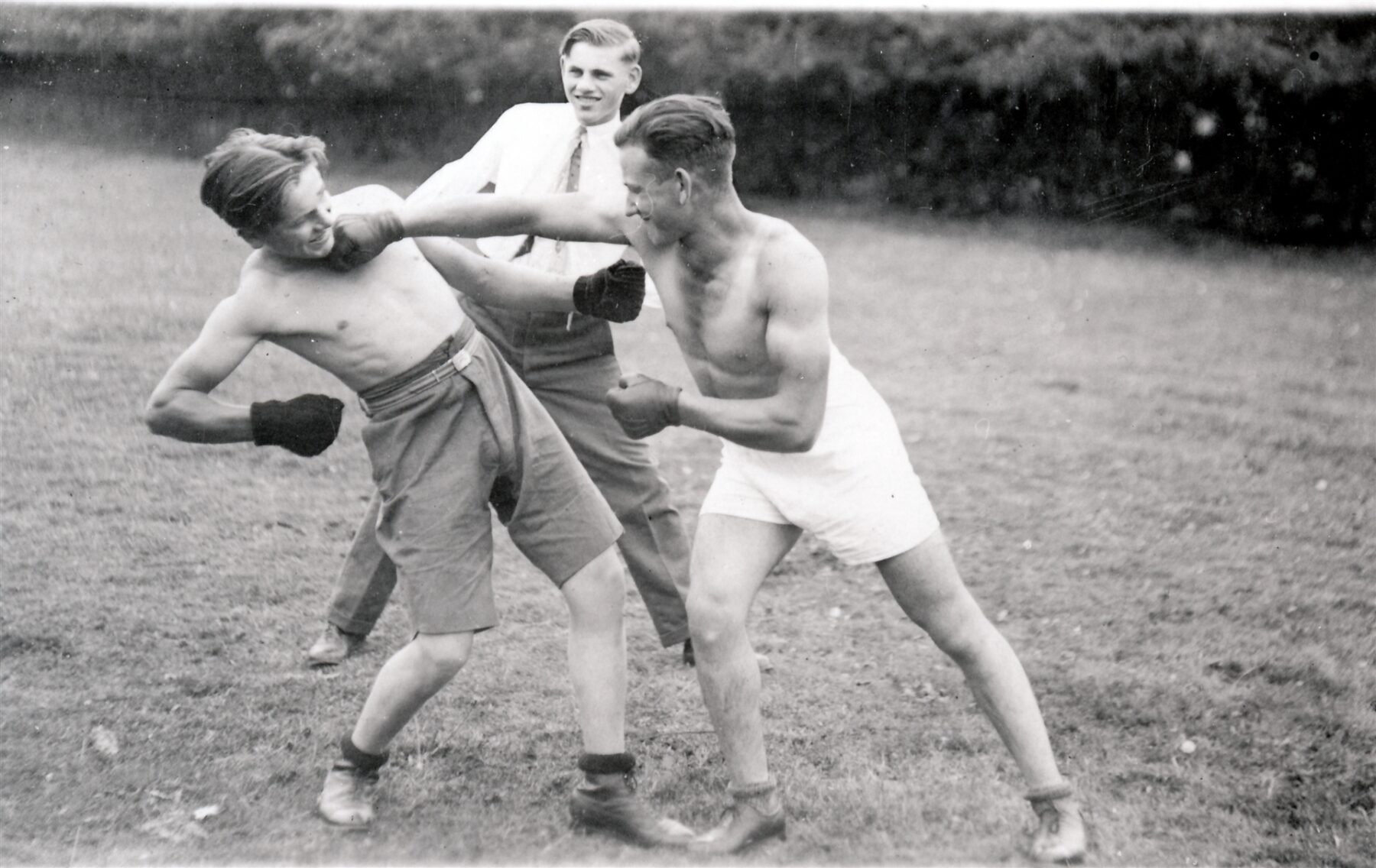
1920-1939
Interwar period
How important is it to live together with your fellow citizens? Do you also approach fellow citizens who do not speak your own language? This was the challenge facing the Belgians with their new fellow citizens from Eupen-Malmedy and the people of Eupen-Malmedy with Flemings and Walloons. What conditions does successful integration require? Did the citizens from the eastern cantons integrate in their new fatherland, could they, and did they want to?

